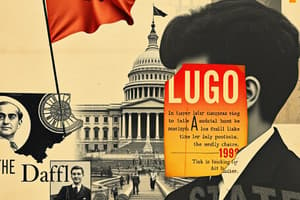Podcast
Questions and Answers
What is the definition of power?
What is the definition of power?
- The ability of individuals to further their interests. (correct)
- Government's legitimate use of power.
- A political system ruling over a territory.
- The undisputed political rule of a state.
What is authority?
What is authority?
Government's legitimate use of power.
What is a state?
What is a state?
A political system that rules over a territory.
What is a nation-state?
What is a nation-state?
What does sovereignty mean?
What does sovereignty mean?
Who are citizens?
Who are citizens?
What is nationalism?
What is nationalism?
What does local nationalism refer to?
What does local nationalism refer to?
What are civil rights?
What are civil rights?
What are political rights?
What are political rights?
What are social rights?
What are social rights?
What is a welfare state?
What is a welfare state?
What is democracy?
What is democracy?
What is direct democracy?
What is direct democracy?
What is participatory democracy?
What is participatory democracy?
What are constitutional monarchs?
What are constitutional monarchs?
What are liberal democracies?
What are liberal democracies?
What is an interest group?
What is an interest group?
What is democratic elitism?
What is democratic elitism?
What does power elite refer to?
What does power elite refer to?
What is state overload?
What is state overload?
What is a legitimation crisis?
What is a legitimation crisis?
What is revolution?
What is revolution?
What are social movements?
What are social movements?
What does historicity mean?
What does historicity mean?
What is the field of action?
What is the field of action?
What is a new social movement?
What is a new social movement?
What is civil society?
What is civil society?
What does ethnie refer to?
What does ethnie refer to?
What does nations without states mean?
What does nations without states mean?
Flashcards are hidden until you start studying
Study Notes
Power and Authority
- Power refers to the ability of individuals to pursue their interests and affects relationships among individuals.
- Authority is defined as the legitimate use of power by governments.
Political Entities
- The state is a political system that governs a specific territory.
- A nation-state has sovereign power in a defined area, with a population that identifies as a cohesive national group.
Sovereignty and Citizenship
- Sovereignty denotes the undisputed political control of a state over its territory.
- Citizens are members of a political community with associated rights and duties.
Nationalism
- Nationalism encompasses beliefs and symbols that express identification with a national community.
- Local nationalism refers to the desire for political autonomy among communities sharing a cultural identity.
Rights and Welfare
- Civil rights are legal rights held by citizens within a national community.
- Political rights pertain to citizens' participation in governance.
- Social rights are those dedicated to social welfare for all citizens.
- A welfare state refers to a political system that provides welfare benefits to its citizens.
Democracy
- Democracy allows citizens to participate in political decisions or elect representatives.
- Direct democracy enables citizens to vote directly on laws and policies.
- Participatory democracy encourages collective decision-making among all group members.
Governance Structures
- Constitutional monarchs act as figureheads while real political power lies with elected leaders.
- Liberal democracies are founded on parliamentary institutions and a free-market economy.
Interest Groups and Democratic Participation
- Interest groups are organized entities that advocate for specific causes through political lobbying.
- Democratic elitism argues that in large democracies, public participation is limited to electing political leaders.
Political Power Dynamics
- The power elite refers to a small group of individuals with concentrated power in society, as defined by C. Wright Mills.
- State overload theorizes that modern states may become overwhelmed by complex administrative tasks.
- A legitimation crisis occurs when a political order fails to sufficiently engage citizens in governance.
Social Change and Movements
- Revolutions involve mass mobilization that overthrows existing regimes, often using violence.
- Social movements are large groups advocating for or against social change, typically in conflict with established organizations.
- Historicity involves leveraging historical understanding to influence present and future societal changes.
- The field of action is where social movements interact with organizations, guided by member perspectives.
Contemporary Social Movements
- New social movements have emerged since the 1960s, focusing on social and economic issues, promoting new ways of thinking and acting.
- Civil society is the sphere of activity located between the state and the market, including families and educational institutions.
Ethnicity and Nations
- Ethnie describes groups sharing ideas of common ancestry and cultural identity connected to a homeland.
- Nations without states refer to groups that seek sovereignty but do not have political authority over their claimed territories.
Studying That Suits You
Use AI to generate personalized quizzes and flashcards to suit your learning preferences.



